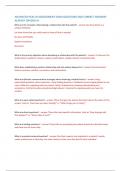ADVANCED HEALTH ASSESSEMENT EXAM QUESTIONS AND CORRECT ANSWERS
ALREADY GRADED A+
What are the concepts of developing a relationship with the patient? - answer-See the patient as a
unique individual
Let them know that you really want to know all that is needed
Be open and flexible
Explain boundaries
Be honest
What is the primary objective when developing a relationship with the patient? - answer-To discover the
details about a patient's concern, explore expectations, display interest, and partnership
What does establishing a positive relationship with the patient depend on? - answer-Communication
built on courtesy, comfort, connection, and confirmation.
What are effective communication strategies when obtaining a health history? - answer-Using
openended questions, direct questions, rarely leading questions. Facilitate by encouraging patient to say
more. Reflect by repeating what you heard. Clarify. Empathize by showing understanding and
acceptance. Confront by discussing disturbing behavior. Interpret by repeating what you heard to
confirm.
What are open-ended questions? - answer-Those that give the patient discretion about the extent of the
answer. Such as "How have you been feeling?" or "What brings you in today?"
What are direct questions? - answer-Those that seek specific information. Such as "How long ago did
that happen?" or "Where does it hurt?"
What are leading questions? - answer-Those that are prompting the patient toward the desired answer
and these are the most risky.
What is a patient centered question? - answer-One that respects and responds to a patient's wants,
needs, preferences so that they can make choices in their care that best fit their individual
,circumstances. Such as "How would you like to be addressed?", "What would you like us to do today?",
"How are you coping with your illness?".
What are potential barriers of patient and provider communication? - answer-When the patient is
curious about you, anxiety, silence, depression, crying/compassionate moments, physical & emotional
intimacy, seduction, anger, avoiding the full story, financial considerations.
What is the structure and components of the patient history? - answer-Patient identifiers, chief
complaint, history of present illness, past medical history, family history, personal/social history, review
of systems
What kind of patient information is obtained in the patient identifier component of the patient history?
- answer-name, age, gender, race, occupation, date, time, and referral source
What kind of patient information is obtained in the chief complaint component of the patient history? -
answer-a brief statement about why the patient is seeking care while probing for underlying concerns.
What kind of patient information is obtained in the HPI component of the patient history? - answer-a
chronological order of events leading up to the presenting problem, health status prior to the onset, a
complete description of first symptoms, symptom analysis (onset, location, description, duration,
intensity, character, aggravating factors, alleviating factors), impact on patients lifestyle, medications or
treatments tried
What kind of information is obtained in the PMH component of the patient history? - answer-general
health/strength childhood illnesses major adult illnesses and chronic diseases immunization
surgeries (dates, hospital, diagnosis, complications) serious injuries resulting in disability limitation of
ability to function d/t past events
medications allergies (meds, environment,
seasonal, food) transfusions recent screening
tests emotional status
What kind of information is obtained in the family history component of the patient history? - answer-
Any relevant medical problems for both immediate and non-immediate family members
,What kind of information is obtained in the personal/social history section of the patient history? -
answer-home environment and conditions (pets, economic) where was the patient raised
education
position in family marital status life satisfaction
hobbies/interests source of stress habits (nutrition,
sleep, drugs, etoh, ADL's, and smoking) self-care (self
breast exams, exercise, home remedies) sexual history
environmental (travel, exposure to diseases) religious
and cultural preferences access to care
What information is necessary when obtaining sexual health information? - answer-number of partners,
concerns, birth control, protection from STI's
What kind of information is obtained for the ROS component of the patient history? - answer-those that
identify presence or absence of health related issues in each body system
What is subjective data? - answer-it is information collected during the patient interview with the
patient or significant other. it is their words. It can include symptoms, sensations, feelings, perceptions,
desires, preferences, beliefs, ideas, values, personal information, ROS, complete health history
What is objective data? - answer-it is the information that can be physically seen by the provider and
tested against. It can include the physical exam, lab analysis, x rays, and professional consults.
How do you approach sensitive issues when interviewing a patient? - answer-Provide privacy, be direct
and firm, don't ask leading questions, use open-ended questions, don't apologize for asking questions,
don't preach, avoid confrontation, use understandable language, watch medical jargon, document
carefully using the patient's words.
What does it mean to be culturally aware? - answer-It is the deliberate self-examination and in depth
exploration of one's own biases, stereotypes, prejudices, assumptions that one holds about people
different than them.
, What does it mean to be culturally competent? - answer-It requires the provider to be sensitive to a
patient's heritage, sexual orientation, socioeconomic situation, ethnicity, and cultural background
physiologic jaundice - answer-A 3-day old infant is noted to have a mildly elevated unconjugated
bilirubin level and icterus. Your concern is that this child may have:
a. physiologic jaundice
b. kernicterus
c. glucose-6-phosphate dehydrogenase deficiency
d. pathologic jaundice
Lysosomes - answer-Which cell component is capable of cellular autodigestion when it is released during
cell injury?
a. lysosomes
b. ribosomesc. smooth endoplasmi c reticulum
d. golgi complex
Which component of the cell produces hydrogen peroxide (H2O2) by using oxygen to remove hydrogen
atoms from specific substrates in an oxidative reaction?
A) lysosomes
B) peroxisomes
C) ribosomes
D) oxyhydrosomes - answer-Ans: B- peroxisomes
Contain organelles and complex internal membranes - answer-The difference between eukaryotes and
prokaryotes is that eukaryotes:
a. all of these answers are correct
b. are smaller in size
c. contain organelles
d. have no nuclear membrane




